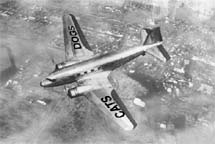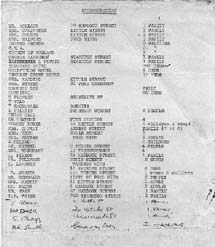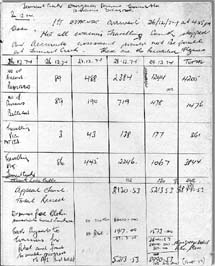The days after Cyclone Tracy
Les Liddell was handed a Disaster Plan
'just in case' only four days before
the cyclone hit Darwin. This is his
account of what happened when Tracy's
refugees started to arrive in Tennant.
On the twenty-fifth of December 1974, Cyclone
Tracy hit Darwin, and that was the real beginning of the panic session.
We had to decide what we should do and how we should operate.
It was a matter of sitting here and very quickly reading the 'disaster-plan'
to give us some indication of what we might expect, or how we should
operate a system to co-ordinate everything that was going to happen.
Which we didn't really have much idea on what or how it would happen.
But we soon found out about that!
On Christmas morning, we knew the cyclone had hit Darwin and communications
were wiped out. The service clubs of Tennant Creek were called together
to co-ordinate a cyclone relief committee. That was the Lions Club and
Apex. We had a meeting at nine a.m., on Boxing Day morning at the C.W.A.
Hall to quickly identify the major roles which we would have to play,
and what we would need, and how we could get food and supplies through
to Darwin. Because we had no communications at this stage it was very
difficult to really commit anything at all.
So we put a loud speaker in the back of a utility and we toured the
streets of Tennant Creek informing the people of the meeting we were
having, to establish the requirement of the goods and services we would
need. Also, with the co-operation of Peko Mines, we nutted out what
was really necessary to do.
The C.W.A. was set up as a receiving centre for any people coming south
from Darwin, to call into first, and we'd find out who they were, where
they came from, where they hope to be going to and how they were going
to get there.
At this point we had a large kitchen in operation, run by the ladies
from the Country Women's Association, in conjunction with the Peko cooks,
and we were able to supply a hot meal to the people as they arrived
in town.
I asked the police could I interview some of the first refugees to arrive
in town to see what really happened in Darwin. The first person to come
in was clad just in his pyjamas. When I spoke with him he said he was
in such shock in Darwin he just jumped in his car and drove. Katherine
was too close to Darwin, and Tennant Creek was really the first major
town he could pull up at and feel safe again.
I asked what made him leave Darwin in a such a state of shock. He said
to me, he was looking out his kitchen window at two small children,
a boy and a girl, and the boy was holding onto his sister's hair to
try and stop her from blowing away when a sheet of iron came and cut
both his arms off. He said, "And that was it."
That was the shock that he was in, and he left Darwin. He said there
would be many more like that coming, because of the situation.
Now, in assessing our position, we knew then that we were dealing with
mass shock of everyone that came in. This would be a problem because
Tennant's only a small town, it was a town then of two-and-a-half to
three thousand people. The town caters for itself with approximately
a ten day supply of food and essentials, and with the influx we expected
to come down the road the biggest problem was: where we were going to
get enough food and supplies from to enable these people to continue
on to either Alice Springs or Mt Isa, whichever way they chose to go?
After the first day we had some three hundred people arrive, all in
a similar state of shock. They all needed clothes, some needed medical
attention, others needed a good feed and a bed for the night, but they
seemed to be coping quite well.
The second day we had some twelve hundred people arrive, and this really
started to extend the resources of our committee, because no-one wanted
to go home, they liked to work twenty-four hours a day. Its very difficult
to tell them, after twelve hours, they've got to have some sleep too
because this is not just a one day operation, it was going to go on.
Actually, it went on for fourteen days.
On the third day, a Salvation Army Captain, Laurie Venables, arrived
from Alice Springs, and he had a bus load with four ton of flour on
it. He said the flour was for the baker to make bread, in turn that
would make the sandwiches to feed the evacuees coming south, and that
way would alleviate the food problem.
He came up to me and he said, "Les, I think you'd better stop and
have a cup of tea with me for a few minutes." This I did.
He then began to explain that whilst we were doing a good job here under
the present circumstances, it could be made easier and would be more
efficient to operate, if we broke the service up into more divisions.
We first needed a registration division for the people as they arrived
in town, to get their details of who they were, where they've come from,
where they were going, what was their vehicle registration number, etcetera.
Once this was given, and they virtually told the story to that person
at the desk of what happened in Darwin - this was then to become the
first treatment of shock - of getting it out of the people's system.
From that registration point they were then directed to the C.W.A. Hall
where they were given a hot meal, and there again, they told the same
story to the cook or whoever served them the meal. The third building
we then set up was a clothing building. We'd set that up at the Uniting
Church, so once the people had a hot meal they could go over and get
sufficient clothes or whatever they needed to carry on their journey.
The fourth point then was the billet allocation. We toured the town
with the loud-speaker car, asking everyone to give their names, how
many they could billet, who they preferred - male or female - etcetera.
They were then rung up, and they came to the Uniting Church Hall, and
picked their lodgers up, took them home for the night where they were
fed, bedded down and returned the next morning ready for their journeys
either south or east.
This worked quite well, and we broke it into twelve hour shifts, a day
shift and a night shift. The people still continued to come, around
about eight to nine hundred a day, sometimes up to fourteen hundred,
for the first eight to ten days, before they dwindled off.
After the sixth day, heavier rains over in the Mt Isa area cut all Mt
Isa off, and the people we had sent across that way had to return to
Tennant and then go back via Alice Springs.
With people coming back from Mt Isa, this created bigger burdens on
the transport systems out of Tennant Creek and beyond.
At this stage we then made contact with the Commonwealth Railways in
Port Augusta, to make available on the South Australian/N.T. railway
line, all trains they could. I received a telex back late that afternoon,
on the Saturday, saying that they'd made all trains, to the limit of
the line, available for the movement of the evacuees' cars, and passengers,
at the Commonwealth's expense.
Another problem we were having at this time was that the Commonwealth
had told us that there would be no monies available at Tennant Creek
for the evacuees. They would have to wait until they reached either
Mt Isa or Alice Springs. This led to the people in Tennant Creek running
our own fund to raise monies to pay for the foods and the petrol and
the tyres that were necessary, and the incidentals for these people
to get to Alice Springs or Mt Isa.
In the end we were spending money faster than we could raise it, which
is normal in these situations. The first day was $10,000, the second
day was $20,000 and then up it went. It got to $40,000, $50,000, and
finally in the end we owed something like seventy-two thousand dollars.
On the fifth day the Administrative Officer here, Tony O'Shea returned
from his holidays at Perth, and he said because we had organised this
operation, that he didn't really want to get involved in the financial
side of it. And because we'd committed the monies, it was our problem
to pay for it.
As a public servant he hadn't authorised any payment of monies, so he
didn't want to bite into the argument. However, we took this job on
and we assured him that we would carry it through, and everything would
be paid for, and there would be no burden to the Northern Territory
Government - or District Office as it was then known.
We asked the funding committee in Alice Springs - they had raised a
hundred thousand dollars on their first day of operation - we just asked
them each couple of days for ten or twenty thousand dollars to continue
on our way to get these people through to the southern ports. They were
very co- operative and in the end we did receive the monies from them
to clear all accounts.
At the end of the operation we had $123 left out of the $72,000 - which
we duly returned to the Alice Springs branch. That was how we funded
the operation.
When you are in charge of an operation of this magnitude there are many
and varied things that happen. One such incident involved the aircraft
evacuating the women from Darwin, which were coming via Tennant Creek,
mainly for the purpose of refuelling.
As these planes came into Tennant Creek the captain would radio in through
the D.C.A. as to how many persons were on board. We had a little committee
there that would run the cups of tea and the sandwiches out to feed
them before their long journey to Sydney.
This particular day we had an urgent call from the captain that a doctor
should attend the aircraft. We rang the hospital for the doctor. "Would
he be able to go out?" He said he was that flat out with dealing
with injured people there that it was not possible to go out on the
strength of a message, and could we deal with the problem? So, I went
to the airport. It was an Ansett Fokker Friendship coming in with fifty-three
persons on board - they were all women, mostly pregnant - and the report
was that one of the young girls on board had German measles, and would
I go out and advise these ladies that we couldn't cope with that situation
here, but when they got to Sydney they'd all have to go and have an
injection, and report to the hospitals for the medical clearance, or
whatever was required of them.
Its very difficult, when you're young, to go and confront fifty-odd
women and speak of subjects such as this when you're not really briefed
in them. So I sort of sat back for a minute when I got there, and while
they all enjoyed their cup of tea I picked out what I thought was the
ringleader, the lady who had control of most of them, and seemed to
be talking the most to them.
I pulled her aside and explained to her what the problem was, and she
immediately hopped up on a chair and told the women the problem was
and what had to be done. That took care of that problem. As I sort of
backed away from it and thought, "Well, that was a job well done
- and easy done", the captain of the aircraft said to me, "Lad,
you've done a good job there. I didn't know how to handle it because
I have to fly with them. You really handled that very tactfully".
That was the first one.
On the same aircraft too we had to remove a dog from the aircraft -
being a non-pressurised hull, animals
couldn't travel in the freight hold of this aircraft, so it had to be
removed and taken to Alice Springs and then flown to Sydney. The young
girl who owned the dog was in tears because we had to remove it from
the aircraft. But we assured her that everything would be right, and
everything would be looked after and taken care of.
I asked the hostess after, 'How did you find out she had a dog in her
basket?" She replied, "The basket started walking down the
aisle, and when we had a look there was no base in the basket".
And then there was another.
Towards the end of the long operation there was another aircraft we
got a call from at three a.m. in the morning. It was a Connellan's DC3
plane coming in to land. He asked for a pint of milk and a bucket of
water.
We said, "Well, how many passengers have you got?" He radioed
back, "Oh, don't you worry about the passengers, you just bring
out the pint of milk and the bucket of water!" So this we did.
We pulled up at the airport with a pint of milk and bucket of water.
The pilot hops out, and we are waiting for someone else to come out
- and nobody comes out of the plane. He said, "Oh, the milk's for
me." I said, "Oh, that's alright then, but what's the water
for?" He said, "You just hop in the plane and you'll see."
We hopped inside the plane and down one side of the aircraft he's got
all the dogs tied up, and down the other side he's got all the cats
tied up. They all had labels with their names on, and destinations where
they were going to.
They were the animals that were taken from the people at Darwin Airport
who were told that their pets would get down eventually, rather than
be destroyed. This is how it was done.
They flew these animals from Darwin to Alice Springs, and then on to
Sydney. And it was the greatest thing - a humane thing - I've ever seen,
to see all these animals sitting quietly there in this aircraft.
It was one of the great things towards the end of it.
The preceding article is an extract from the transcript of an interview
recorded with Les Liddell in 1994 by Francis Good.
Copyright is held by the Northern Territory Archives Service, and publication
or copying is not permitted without permission from the copyright holder.


This is a DC2 and
not a DC3 and it's definitely not Connellan.


Les's Log Sheets from
the Operation.